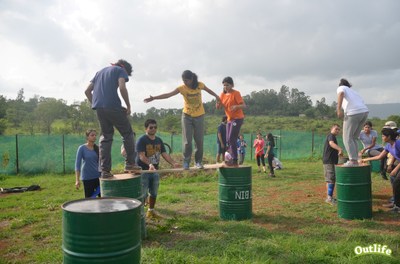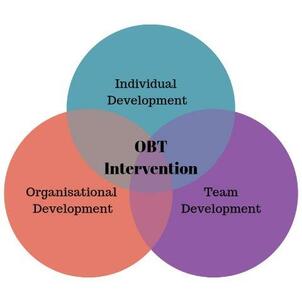Outbound Training for Managers
|
Embarking on the journey as a manager is filled with challenges, and navigating these hurdles requires more than just traditional managerial skills. Outbound training for managers is a powerful tool that equips them with the ability to learn in a realtime scenario where they can lead, inspire their teams, and make strategic decisions while under challenges.
Outbound Training or Outbound Learning is a training intervention method for enhancing managers, leaders and management team performance through participation in simulated outdoor, outbound and experiential learning activities. In today's competitive landscape, managers need to be adept at handling diverse teams, fostering collaboration, and driving performance. From outdoor team-building activities to workshops focused on problem-solving and decision-making, outbound training offers a hands-on approach to developing these essential skills in a dynamic and engaging environment. Managers are engaged into outbound training actvities that include outdoor group development activities to create a immersive learning experience and to bring out the desired learning outcomes and behaviors. Achievement, performance and behaviors during outbound training games are reviewed through a process of discussion called debriefing, to identify behaviors that enhance performance or lead to failure or decreased performance. |
Outbound Training Interventions
| ||||||||||||||||||
The importance of outbound training for managers
Outbound training for managers goes beyond the confines of a traditional classroom setting. It provides an immersive learning experience that enables managers to enhance their leadership skills in a practical and impactful manner. Through experiential activities and simulations, managers are pushed out of their comfort zones, encouraging them to think on their feet, collaborate with their teams, and adapt to unforeseen challenges.
This type of training fosters personal and professional growth, enabling managers to gain valuable insights into their own leadership styles and how they can better connect with their teams. It also instills a sense of camaraderie among team members, fostering a cohesive and supportive work environment. The impact of outbound training extends beyond individual development, positively influencing team dynamics and overall organizational performance.
This type of training fosters personal and professional growth, enabling managers to gain valuable insights into their own leadership styles and how they can better connect with their teams. It also instills a sense of camaraderie among team members, fostering a cohesive and supportive work environment. The impact of outbound training extends beyond individual development, positively influencing team dynamics and overall organizational performance.
How Outbound Training Intervention enhances Managerial Effectiveness
As managers, individuals are tasked with overseeing teams, meeting objectives, and driving organizational success. However, the complexities of modern workplaces have given rise to a new set of challenges that require a different approach to leadership. In today's competitive landscape, managers need to be adept at handling diverse teams, fostering collaboration, and driving performance.
Managers are often confronted with situations that demand quick thinking, effective communication, and the ability to motivate and guide their teams through obstacles. Traditional management training may not fully prepare them for these real-world scenarios. This is where outbound training comes into play. It offers a hands-on approach to developing essential skills in a dynamic and engaging environment.
Outbound Training involves an informal environment, surrounded by nature and tranquility, people become more natural and reflective, paving the way for a complete and effective learning process. Achievement, performance and behaviors during outbound training games are reviewed through a process of discussion called debriefing, to identify behaviors that enhance performance or lead to failure or decreased performance.
Strategies are formulated to deal with factors that hinder performance and these strategies are then put to use in the outbound activities that follow, to test their effectiveness and ultimately help the participants learn to change behaviors back at work.
Managers are often confronted with situations that demand quick thinking, effective communication, and the ability to motivate and guide their teams through obstacles. Traditional management training may not fully prepare them for these real-world scenarios. This is where outbound training comes into play. It offers a hands-on approach to developing essential skills in a dynamic and engaging environment.
Outbound Training involves an informal environment, surrounded by nature and tranquility, people become more natural and reflective, paving the way for a complete and effective learning process. Achievement, performance and behaviors during outbound training games are reviewed through a process of discussion called debriefing, to identify behaviors that enhance performance or lead to failure or decreased performance.
Strategies are formulated to deal with factors that hinder performance and these strategies are then put to use in the outbound activities that follow, to test their effectiveness and ultimately help the participants learn to change behaviors back at work.
Outbound Training Intervention Tools
The Outbound intervention involves a long term approach towards behavioral change than a one off outbound training and includes a variety of tools that are based on expereintial education, Group Process Facilitation, Gestalt Therapy, NLP, Coaching, Psychometric Instruments, Simulations, Sensitivity Training, Role Plays, Case Studies, Team Building Activities, Management Games, Management Concepts and Frameworks.
Structured Learning Cycle
The outbound facilitation consists of structured experiential learning cycle which includes various stages such as
Experiencing/doing
Reviewing and reflecting on the experience
Drawing learning from the reflection
Applying and testing the learning through active experimentation
Reviewing and reflecting on the active experimentation
Experiencing/doing
Reviewing and reflecting on the experience
Drawing learning from the reflection
Applying and testing the learning through active experimentation
Reviewing and reflecting on the active experimentation
To maximize the benefits of outbound training, It's essential to set clear objectives for the training, outlining the specific skills and competencies that managers should develop or improve. Additionally, creating a supportive and open-minded environment is crucial for encouraging active participation and meaningful learning experiences.
Furthermore, integrating reflection and debriefing sessions into the training process allows managers to gain valuable insights from their experiences and apply them to real-world scenarios. These sessions provide opportunities for self-assessment, feedback, and the identification of actionable takeaways that can be implemented upon returning to the workplace.
Furthermore, integrating reflection and debriefing sessions into the training process allows managers to gain valuable insights from their experiences and apply them to real-world scenarios. These sessions provide opportunities for self-assessment, feedback, and the identification of actionable takeaways that can be implemented upon returning to the workplace.
Outbound Training Interventions for Management Development
Outbound training for managers goes beyond the confines of a traditional classroom setting. It provides an immersive learning experience that enables managers to enhance their leadership skills in a practical and impactful manner. Through experiential activities and simulations, managers are pushed out of their comfort zones, encouraging them to think on their feet, collaborate with their teams, and adapt to unforeseen challenges.
This type of training fosters personal and professional growth, enabling managers to gain valuable insights into their own leadership styles and how they can better connect with their teams. It also instills a sense of camaraderie among team members, fostering a cohesive and supportive work environment. The impact of outbound training extends beyond individual development, positively influencing team dynamics and overall organizational performance.
Outbound Training is versatile methodology based on experiential learning that can be utilised for all types of interventions relating to managerial development and effectiveness programs at all Levels..
The Outbound Training Interventions primarily focuses on broad areas of managerial development the include the Individual andTeam
● For Self Management
● For Leading, Managing and Developing People
● For Leading and Managing Organisations
This type of training fosters personal and professional growth, enabling managers to gain valuable insights into their own leadership styles and how they can better connect with their teams. It also instills a sense of camaraderie among team members, fostering a cohesive and supportive work environment. The impact of outbound training extends beyond individual development, positively influencing team dynamics and overall organizational performance.
Outbound Training is versatile methodology based on experiential learning that can be utilised for all types of interventions relating to managerial development and effectiveness programs at all Levels..
The Outbound Training Interventions primarily focuses on broad areas of managerial development the include the Individual andTeam
● For Self Management
● For Leading, Managing and Developing People
● For Leading and Managing Organisations
Developing the Individual
Developing the individual involves focusing on intrapersonal effectiveness such as:
- Clear and Structured Thinking :- having clarity of thought, approach towards objectives, is structured, ability to make decisions.
- Leadership Stature and Maturity :- ability to motivate self, enable, succeed, utilize appropriate leadership styles, having clear vision of what is required and is optimistic.
- Self Awareness & Renewal :- being aware of emotions, thoughts, values, beliefs and preferences with the desire and ability to learn and grow.
- Self Management :- effectively achieving self control, emotional intelligence, adaptability and work life balance
Developing the Team
Developing the Team involves focusing on the team members developing interpersonal effectiveness such as:
- Interdependence and Cohesion: Developing High Interdependence and Cohesion in the team to achieve results.
- Cross Functional Collaboration: Enhancing cross functional collaboration to achieve a common goal.
- Communicating Effectively:- Effectively communicating with empathy and appropriate to the context.
- Developing Others :- Developing skill and competencies of others through coaching, mentoring and other developmental activities related to current and future roles
- Managing Relationships :- Effectively negotiating, influencing and handling conflicts in the Team
- Managing Teams/ Workgroups :- Managing teams and workgroups; facilitating engagement and living collaborative mindset
Developing the Organisation
Developing the Organisation focuses on evolving the business through systems approach to Human and Systems Processes and involves the following.
- Functional and Business Acumen:- having domain expertise, effective in strategic execution, Deploying business acumen in decision making.
- Setting Vision, Direction and Strategy :- Taking account of a wide range of longer term issues, opportunities, contingencies and identifying means of implementing the plans in line with vision and direction
- Managing & Enabling Change :- Leading and facilitating change on a ongoing basis based on evolving business needs.
- Managing Customers and Value Chain :- Building and leveraging relationships with value chain partners and customers.
- Operations Management :- Ensuring execution excellence, managing processes, building efficiencies.
- Achieving Results : All individual and team efforts should lead to Achieving Desired Results at Work.
The program’s overarching objective is to provide participants with an environment which is conducive to explore teamwork and consequent benefits. We design the program approach using the Team Development Framework such as Drexler-Sibbet model / Rocket Model or 5 Dysfunctions of team-work model.
Outbound Training Intervention Experiences
Outbound Programs takes a customized approach to its design and incorporates assessment, experiences and facilitation of the learning objectives and desired outcomes for transference and application to the workplace and may include many of the following outbound activities.
● Ice breakers
● Energizers
● Behavioural Contract /Ways of Working
● Trust Building Activities
● Communication Activities
● Team Building Activities
● Leadership Development Activities
● Experiential Learning Activities
● Sharing and debriefing
● Processing and Transference
● Ice breakers
● Energizers
● Behavioural Contract /Ways of Working
● Trust Building Activities
● Communication Activities
● Team Building Activities
● Leadership Development Activities
● Experiential Learning Activities
● Sharing and debriefing
● Processing and Transference
Followup and Retention of Outbound Intervention
Follow up and retention of the learning are build through deliberate follow-up, assignments and practice to achieve a Shared Vision, bring a shift in Mental Models and continue Systems Evolution at the workplace.
Procedures that support this phase are:
Procedures that support this phase are:
- Post Program Follow-up
- Teaming Manual / Action Plan / Goal Setting
- Actionable Micro Learning Assignments
- Behavioral Observation Report
- On the Job Coaching
Outbound Training as a Transformative Approach
Outbound training for managers is a transformative approach to developing essential managerial skills in a dynamic and experiential setting. By immersing managers in hands-on activities and simulations, outbound training equips them with the capabilities to effectively navigate through diverse managerial challenges. The impact of outbound training extends beyond individual development, positively influencing team dynamics and overall organizational performance.
Managers and organizations can harness the power of outbound training by customizing programs to address specific challenges, strategically planning the training process, and measuring its effectiveness through tangible metrics. The success stories of organizations that have leveraged outbound training to enhance managerial effectiveness serve as compelling evidence of the value and impact of these programs. By embracing outbound training, managers can elevate their leadership abilities and drive meaningful organizational change.
Managers and organizations can harness the power of outbound training by customizing programs to address specific challenges, strategically planning the training process, and measuring its effectiveness through tangible metrics. The success stories of organizations that have leveraged outbound training to enhance managerial effectiveness serve as compelling evidence of the value and impact of these programs. By embracing outbound training, managers can elevate their leadership abilities and drive meaningful organizational change.
Call us: 7729988781, Email: [email protected]
We Conduct Outbound Training Interventions in Hyderabad, Bangalore, Chennai, Pune, Mumbai, Delhi, Vizag, Kolkata and rest of India
We Conduct Outbound Training Interventions in Hyderabad, Bangalore, Chennai, Pune, Mumbai, Delhi, Vizag, Kolkata and rest of India







